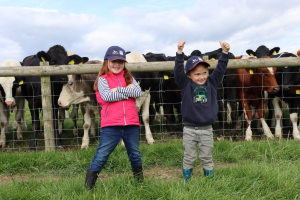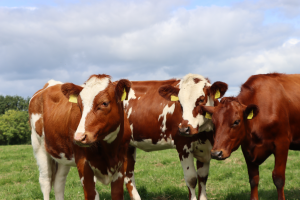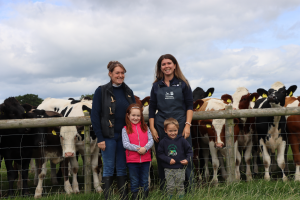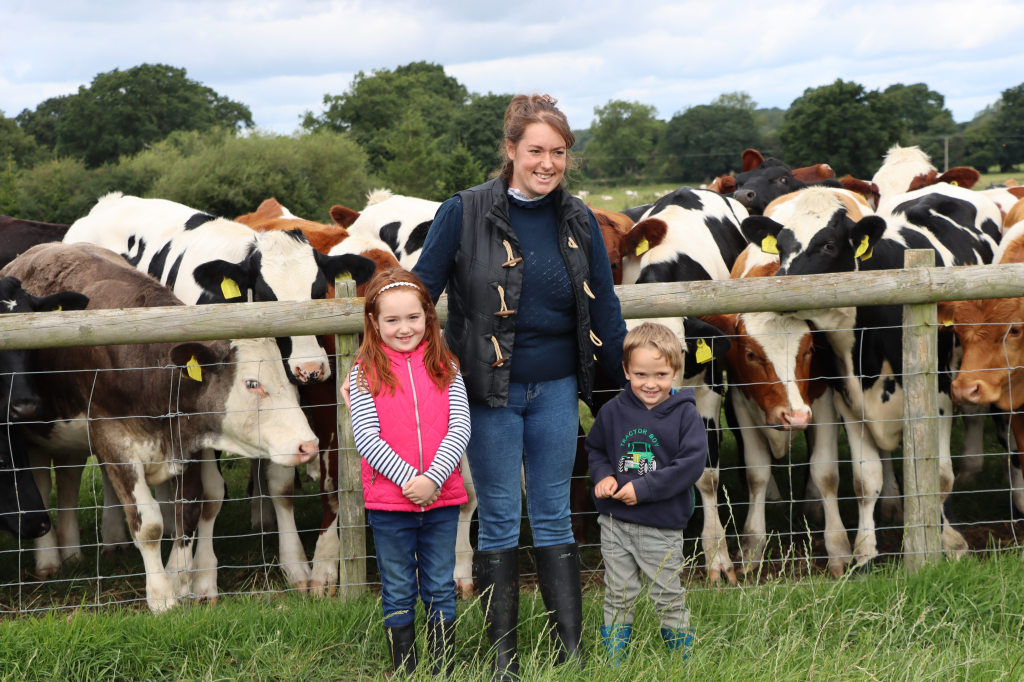Hannah Potter and her family, based in Shrewsbury, have been operating their farm as a team following the sudden passing of her husband, Graham, earlier last year.
Graham Potter was a devoted farmer who wanted a thriving farm with great fertility. He dedicated his life to his herd and family.
Despite never having worked on the farm full-time, Hannah strived to keep the farm thriving. She has worked with her Reproduction Management Specialists and staff to seek real improvements amongst the herd. Hannah achieved this whilst taking care of her two children, Olivia, aged seven, and Giles, aged four.

Reflecting on the previous difficult year, Hannah said: “My worry was that the main cog of our family and the farm had gone.” Even with those fears in mind, she and the support system surrounding her were able to keep the farm running. Additional improvements were also implemented along the way.
Why did they choose to use RMS?
The Potter family have been loyal Genus ABS customers for over 17 years. They have also utilised the Reproductive Management System (RMS) for over 10 of those years. This was due to Graham’s desire of growing his cow numbers.
Aware that he could not spread himself so thinly across all farm-related tasks, Graham felt that professional help from RMS would best support the growth of his herd.
What does their system look like on farm?
The Potter family
Location: Shrewsbury, Shropshire
Breed: Holstein / Fleckvieh / Norwegian Red
Herd size: 260 + 86 replacements
Contract: Arla 360
Back when the farm was operated by Graham’s father, they worked on an all-year-calving system. During this time, they used Friesian and British Friesian genetics.
During Graham’s time running the herd himself, he changed their breeding decisions and began working with a three-way-cross. This included Holstein, Fleckvieh and Norwegian Red genetics, on an autumn block calving schedule.
His wife, Hannah, says the crossbreeding approach has worked extremely well for them. She said: “The litres that we get from them is unbelievable!”
These long-lasting crossbreeds provide Hannah and her family with over 9000litres every year. They also offer a ‘beefier’ animal at the end of their productive lives. This is a significant improvement as the herd were producing just over 8000 litres previously.

Some cows in the herd are in their 10th lactations, and still show strength and promise going forward. Hannah believes this is due to their crosses and great genetics used throughout.
They have now been operating on an autumn block calving system for over eight years. By using the right genetics for their operation, the Potter family are seeing great results.
This autumn block calving herd operate on a calving interval of 378 days.
Animals in the herd now have a submission rate of 74%, conception rate of 46.5% and pregnancy rate of 33%. It is clear the Potter family are making the correct decisions when it comes to breeding and fertility.
These statistics increase significantly for their heifer population. They have a submission rate of 85%, conception rate of 54% and pregnancy rate of 44%.
Hannah and her valued farm consultant have worked together to also make environmental changes for her animals. This involved altering the lighting in the maiden heifer’s sheds to come on between four and 10am in the morning, and four and 10pm in the evening.
By changing the lighting, they were able to extend the daylight hours for their animals. Along with a separate ration for their maiden heifers, they have encouraged them to have higher feed intakes. This has resulted in higher energy and stronger bulling heats resulting in better pregnancy rates.
Working with Genus ABS to make improvements on farm
Following the passing of Hannah’s husband Graham, she has worked tirelessly to continue his legacy. “When I lost him, I knew straight away that the one thing that I had to get right, and that I was scared of the most, was the fertility.
“I knew that for us, it was something that we were going to have to have a real focus on as a team.”
With ambition of their dairy herd reaching over 300 in size, the team have 86 heifers coming through to add to their 260-cow herd.
Following a meeting with their Breeding Advisor, Geraint Windsor, in the previous year, Hannah knew that improvements needed to be made regarding their maiden heifers. To do this, they stripped the Yorkshire boarding from the sheds with a hammer to allow for daylight, in an attempt to mimic the spring season.
They also work hard to keep the heifers on a tight schedule, whereby they are up at four o’clock in the morning, are fed, and are then left ready for their Specialist, Becca, to examine them.

This strategy appears to be working as 76.8% of the herd is pregnant with an average DIM at first breeding of 59 days.
When discussing the support she has received from RMS, Hannah added: “For me, after the year we’ve had, knowing that Becca turns up and just takes control of it is great.
“If we did not have RMS here in that situation, I don’t know what I’d have done. It would have been really hard. Becca is definitely our key, not only as a Specialist but she’s become a friend here.
“She has been a really good support to me and the children and to the whole team.”
Not only have the Potters seen outstanding results with RMS, but they are also confident in their use of Sexcel, sexed genetics. Hannah estimates that approximately 98% of their Sexcel calves are female, which is perfect for a growing dairy herd.
Coming together as a team
The last year has been extremely difficult and heart-breaking for the Potter family and Hannah says the biggest obstacle was getting through it all without her late husband, Graham.
Aside from Genus ABS, Hannah also credits the farm’s success to her family, particularly her father, Neil, who had been shadowing Graham on farm for the last 10 months prior to his passing, her mother-in-law, Hazel, who has supported her through everything, and staff member, Scotty, for stepping up and offering a reliable helping hand with the herd.



